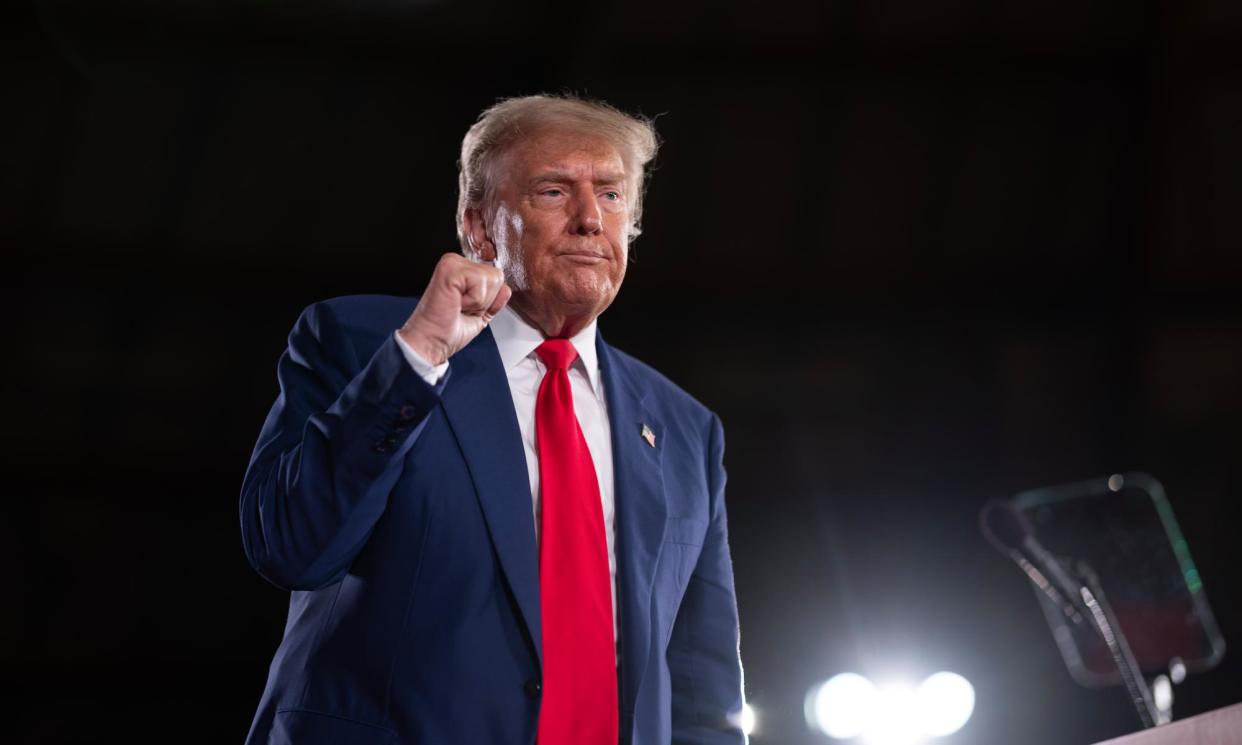US campus protests give Trump a target for his violent rhetoric of vengeance

- Oops!Something went wrong.Please try again later.
- Oops!Something went wrong.Please try again later.
Donald Trump delights in railing against his enemies, and when protesters set up encampments at college campuses nationwide to decry Israel’s invasion of Gaza, the former US president gained another useful antagonist.
For some observers, Trump’s language is both dangerous in the current political environment as he seeks to rile up his base and a dark hint at how he might treat dissent and demonstrations should he defeat Joe Biden and achieve his ambition of returning to the White House in 2025.
His language is certainly extreme.
“These are radical-left lunatics, and they’ve got to be stopped now,” Trump said earlier this month outside the Manhattan courtroom where he is being tried on business fraud charges.
The day prior, police had rounded up demonstrators at Columbia University, home to one of the most contentious protest sites. Trump called the sweep “a beautiful thing to watch”.
Related: Democrats rally to Biden’s defense over response to pro-Palestinian student protests
He then deployed blood-curdling and violent rhetoric to describe the protesters. “Remove the encampments immediately. Vanquish the radicals, and take back our campuses for all of the normal students who want a safe place for which to learn,” he said at a rally in swing state Wisconsin. “The radical extremists and far-left agitators are terrorizing college campuses, as you possibly noticed, and Biden’s nowhere to be found.”
Joe Biden has in fact weighed in on the protests, acknowledging that the right to demonstrate is protected in the country while saying “dissent must never lead to disorder”.
But the campus unrest has nonetheless vexed the Democratic president as he navigates a backlash to his support for Israel, which may cost him votes essential to winning the November election against Trump, the presumptive Republican nominee whom polls show currently has a narrow lead over Biden.
When it comes to the protests, the former president’s course of action is far more clearcut. Though congressional investigators have blamed Trump for instigating the deadly January 6 attack on the US Capitol, that has not stopped Trump from decrying the pro-Palestinian students as dangerous rabble-rousers who would not be tolerated under his administration.
“It’s an old playbook,” said Robert Cohen, a history and social studies professor at New York University. “Nothing original about it except that he’s more unrestrained, in the kind of ludicrous way he talks about it, because he’s openly fascistic about this.”
“To feel like it’s a beautiful thing when you’re using, basically, military force to suppress dissenters, that’s really sick, if you think about that in the context of a democratic society,” Cohen said.
While the majority of college demonstrations in the United States have been peaceful, police arrested more than 2,500 people at the protests, which have spread to campuses in Europe, the UK, Lebanon and India.
A USA Today/Suffolk University poll released earlier this week indicated that Biden supporters are split in their views of the demonstrations. Among those who plan to vote for the president, 39% oppose the protesters’ tactics but agree with their demands, 30% support them overall and 20% are against them.
There’s far less diversity among Trump supporters: 78% are against the protests, and the ranks of those who support them to any degree are in the single digits.
David Paleologos, director of the Suffolk University Political Research Center, said Trump was reacting to the encampments in concert with conservative news outlets like Fox News, Newsmax and One America News Network, whose personalities echo the former president’s condemnation of the students, and incentivize him to keep up his attacks.
“You’ve got almost dual filters, reinforcing each other: Trump’s comments, and the outlets that these voters watch and trust the most,” he said in an interview.
Trump may also see the protests as a way to win over undecided voters, Paleologos said, since his survey found voters who backed the students were a minority overall.
“He’s figured out that if he criticizes the protesters themselves and their behavior, he wedges into the issue that potentially gets to seven-in-10 voters or two-thirds of voters,” Paleologos said.
It would not be the first time a presidential candidate has profited from attacking student movements, said Cohen, who has studied the years of demonstrations on college campuses against the Vietnam war.
“Doesn’t matter how non-violent they are, how admirable their goals are, dissenting student movements are always unpopular,” said Cohen, blaming the decades-long trend on America’s “overarching culture of conservatism”.
“With these politicians on the right, they love this stuff. They know that playing up these student movements works because people don’t like these student movements,” he said.
Yet the solutions they embrace often only lead to more intense protests.
“Usually when you repress it, it just gets worse in terms of dissent and protest, because people who may not have been concerned about, in this case, Israel and Palestine, they are upset when their friends get arrested for just sitting on a plaza,” Cohen said.

